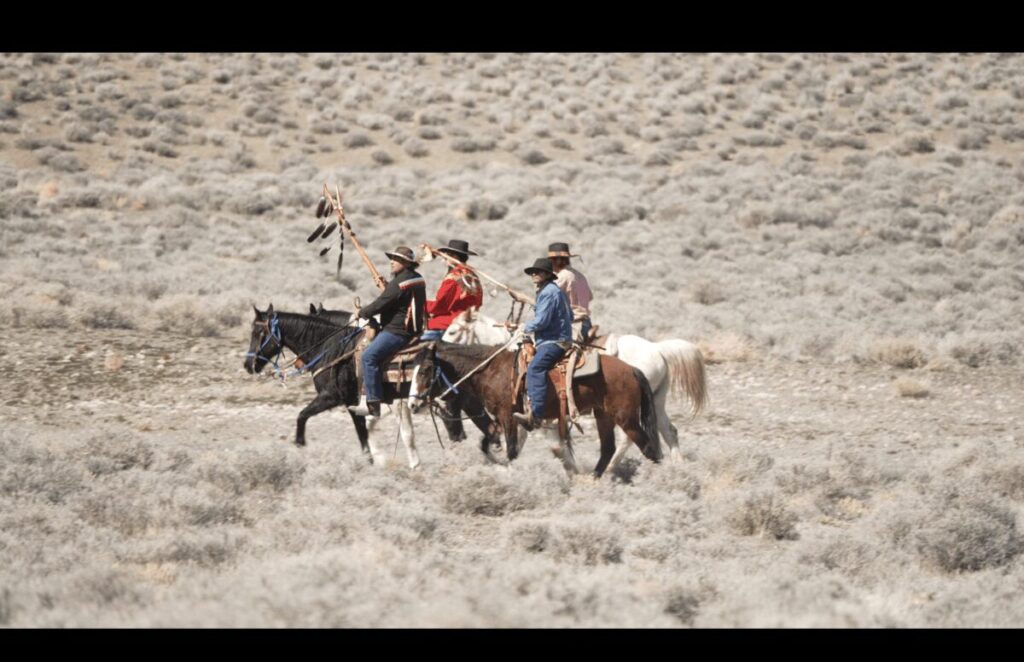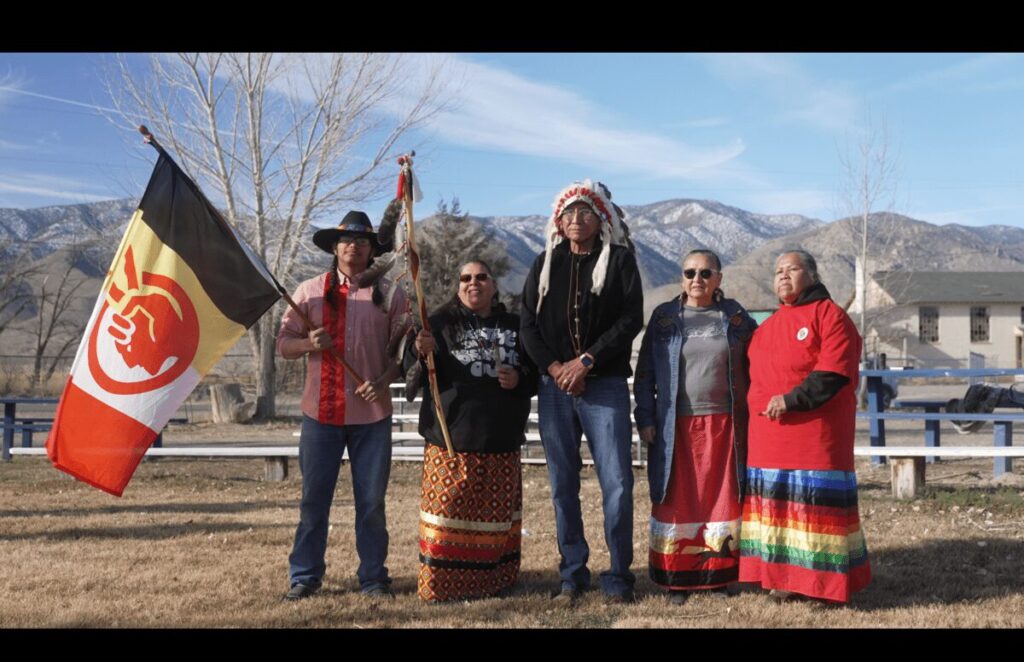
“I’m happy to be a part of this sacred time, when our people are coming back together,” said Chief Arvol Looking Horse, 19th keeper of the Sacred White Buffalo Calf Pipe and Bundle, in his opening comments for the Third Annual Prayer Horse Ride on March 17. Photo credit/River Akemann
Josh Dini learned and practiced his calling as a water protector under the tutelage of Myron Dewey, his elder brother. Dewey was a beloved Paiute Shoshone filmmaker, photojournalist and drone pilot who founded Digital Smoke Signals. This independent media outlet helped show the world images of the Standing Rock movement against the Dakota Access Pipeline, DAPL. Dewey rallied many to the cause of Native territorial and cultural defense. But in September 2021, he died in a car crash.
On Sunday, March 17, the Third Annual Prayer Horse Ride, a tribute Dini created to carry on his work, set forth through the mining-affected communities of Western Nevada. The ride includes walkers, runners and horseback riders. It began in Schurz, a town within the jurisdiction of the Walker River Paiute Tribe where Dewey was an enrolled tribal citizen.
The ride is scheduled to pass through six communities before ending at the sacred site of Peehee Mu’huh, or Thacker Pass, in the McDermitt Caldera. Thacker Pass, an area significant for more than 20 tribes including the Paiute, Shoshone and Bannock, is billed as the country’s largest lithium mine. The brothers were a part of the resistance to that and other destructive mining projects on historic tribal territories.
The 9th U.S. Circuit Court of Appeals allowed the Lithium Nevada Corp. to proceed with mining in June 2023 when it denied a lawsuit by tribes and other opponents. In the latest news on Thacker Pass, reported March 14, the U.S. Department of Energy plans to lend Lithium Americas up to $2.26 billion to build the mine.

The ride will raise awareness about that threat and copper mining in the Pine Nut Hills, a holy place to the Nuwu, or Paiute people. It also will honor Missing and Murdered Indigenous Relatives, or MMIR, in Nevada. Supporters say the ride can help revitalize and restore cultural identity, languages, creativity, and supportive lifeways in the Indigenous communities.
“When we lost my brother, it was just a big hit,” said Dini in a recent interview with Buffalo’s Fire. Eight years younger than Dewey, Dini grew up in California, far from his culture and with a father who had been raised in a boarding school. Dewey had encouraged his younger brother to remember ways taught by their elders – listen to the land, speak the language and harvest pine nuts, the people’s medicine food. Dewey also taught him the history of abuses in these ancestral territories and how their people had stood for their rights during the last half-century.
“He’s the one that kept me connected to the work that we’re doing now as a water protector and land defender, and keeping our language and the knowledge of how our people harvest out here,” Dini said.
Dini began thinking about the best way to honor his brother. “In my eyes, I felt like if I didn’t step up, then all the work that he did would just perish with him,” he said. He and Dewey always talked about bringing the horses back for the young ones to start learning to ride.

So the idea of the Prayer Horse Ride was born. He prepared for the first ride in March 2022 with two horses. The young ones bailed on him at the last moment, as did the friend with the horse trailer.
“So I said, well, I’ll be riding these horses up, and I’m going to dedicate this ride to Myron,” Dini told Buffalo’s Fire.
But longtime land and water defender Gary McKinney stepped up. “If you’re going, I’m going with you,” he said.
McKinney is a Duck Valley Shoshone Paiute, People of Red Mountain spokesperson and AIM Nevada council member. He set up an encampment to occupy Peehee Mu’huh in the summer 2021, the year of the federal government’s decision to mine Thacker Pass. Dewey showed up to support the encampment and was a regular participant.
“We held that camp through winter – we had our sacred fire and our stones, we had all the components of a prayer camp, and that’s what we were doing,” said McKinney. “We felt the need to be present while they were making these shifts, this fast-tracking.”
“It’s not about the money; we’ve been poisoned by these guys forever, and it’s about time (U.S. Interior Secretary) Deb Haaland comes out and sees for herself, and it’s time these protection agencies start protecting.”
Gary McKinney- land and water defender
“Fast-tracking is new, lithium is new – the whole concept is a half-cocked strategy to get ahead of China while we’re still here grounded in this place they want to mine. It’s not about the money; we’ve been poisoned by these guys forever, and it’s about time (U.S. Interior Secretary) Deb Haaland comes out and sees for herself, and it’s time these protection agencies start protecting.”
McKinney shared just a few lowlights from a long history of governmental abuse of the region’s residents. Such abuses date to the times of the Peace and Friendship Treaties of the 1860s with settlers’ willful destruction of the rivers and traditional food harvest areas. Destruction continued into the 1900s with secret nuclear testing that exposed residents to a legacy of cancer and other life-threatening ailments.
Perhaps the most painful is the 1865 massacre that occurred in what is known as Thacker Pass. The U.S. Cavalry killed more than 30 and possibly as many as 51 women, children, elders and men as they fled deeper into the pass.
McKinney and Dewey would talk late into the night about such things, and about the way those abuses have carried on to the present day in a new form of “Green Colonialism.” McKinney cast the situation as one in which well-off residents of the Global North can feel good about driving late-model electric vehicles designed to dial down greenhouse gas emissions. Meanwhile, Indigenous peoples of sacrifice zones, like Nevada, suffer the devastation of their territories.
Together they came up with a plan. It followed the model of the American Indian Movement’s Reservation-to-Reservation campaigns of the Civil Rights era. They’d draft petitions in protection of Thacker Pass and other sacred sites, then go from reservation to reservation. They would organize the people and teach them how to file complaints with corresponding federal agencies.
McKinney had already drafted petitions to Haaland, and he and Dewey were gearing up to start a caravan across Northern Nevada. The plan was to teach communities how to file complaints with different government agencies and then follow through. “We wanted to create that support system,” he said.
It was early in the morning of Sept. 26, 2021, when he said goodbye to Dewey for the last time. “I said, ‘Love you Bro,’ and I shook his hand… He took off, and next thing we heard he was in that accident. And those letters to Deb Haaland never went anywhere, because my main man got taken out.”
Dewey and Dini had both attended an earlier ride with the People of Red Mountain, a committee of traditional knowledge keepers and descendants of the Fort McDermitt Paiute, Shoshone and Bannock Tribes working with allies to defend their ancestral homeland. So, when McKinney heard about Dini’s plan to ride in tribute to Dewey, he immediately was on board. The Prayer Horse Ride would gather the communities around the same issues, but prayer and the remembrance of Dewey would be the force to pull them together.
Amber Torres, former Walker River Paiute Tribal Chairwoman and MMIR advocate, was central to organizing support for the ride. “Of course, we wanted to support them because everyone loved and adored Myron Dewey. He helped everyone, all across Nevada and Indian Country as a whole,” she told Buffalo’s Fire.
Besides its importance in bringing the communities together, Torres said, the ride raises awareness about the lack of proper consultation with the tribes and the devastation of sacred sites. It also elevates the problem of the man camps and the subsequent rise in homicides, particularly among women.
“I think it’s really sending that message that when you come on to our ancestral homelands that you need to get our permission and you need to have consultation with us …Sacred sites are torn up without our permission and without our consent.”
Follow this year’s prayer ride at Nanesootuhina Pookoo Goobakatudu (Prayer Horse Ride) on Instagram and Facebook.
Read the backstory in Talli Nauman’s two-part series on the fight against the lithium mine at Thacker Pass:
Tracy L. Barnett is a contributing editor of Buffalo's Fire working remotely from Guadalajara, Mexico. This story was reported by telephone with the assistance of Josh Dini, Gary McKinney,River Akemann, and Ivan Sawyer Garcia.
© Buffalo's Fire. All rights reserved. Content may not be reproduced without written permission from the Indigenous Media Freedom Alliance. See our content sharing guidelines for media partner usage.






